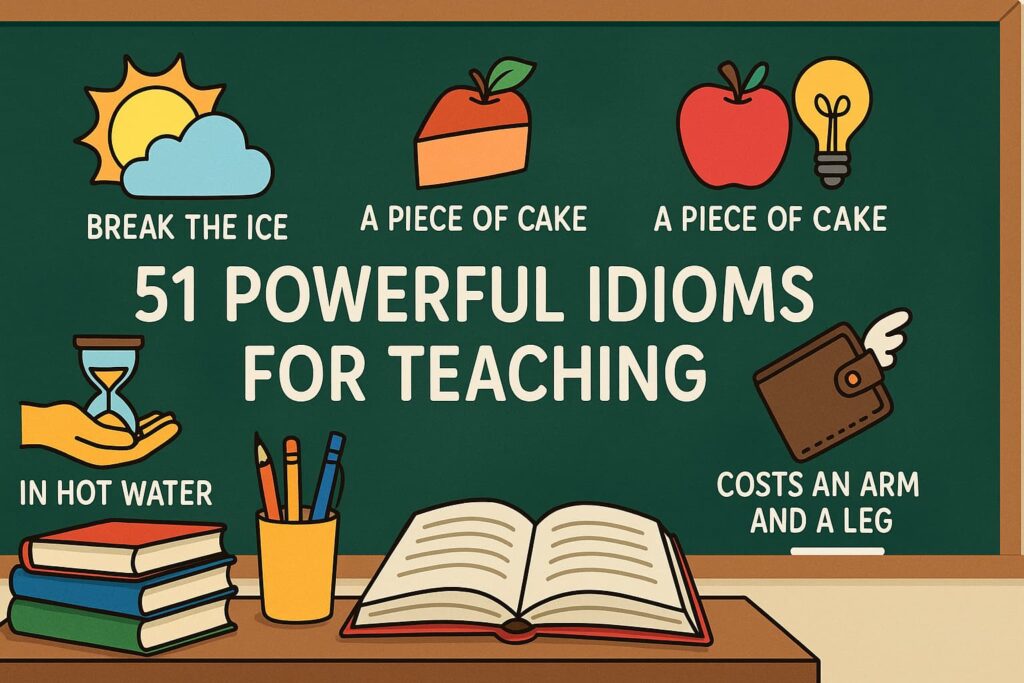Understanding idioms about crime can enrich your English vocabulary and help you sound more natural in conversations, writing, and exams. Crime idioms often convey meanings beyond the literal words, reflecting cultural insights and everyday expressions. Below, you will find 31 popular crime-related idioms, their meanings, example sentences, and alternative ways to say them. At the end, test your knowledge with a fill-in-the-blank exercise and check your answers.
Crime idioms are phrases that use crime-related words metaphorically to express ideas about wrongdoing, risk, deceit, or consequences. They are common in everyday English, movies, news, and literature. Learning these idioms will help you understand native speakers better and add color to your language skills.
31 Crime Idioms Explained
- Break the law
Meaning: To do something illegal
In a Sentence: Mike got in trouble because he broke the law by speeding.
Other Ways to Say: Commit a crime, act against the rules - Caught red-handed
Meaning: To be caught in the act of doing something wrong or illegal
In a Sentence: The thief was caught red-handed stealing from the store.
Other Ways to Say: Caught in the act, caught on the spot - On the run
Meaning: Trying to avoid being caught by the police
In a Sentence: After the robbery, the suspects were on the run for days.
Other Ways to Say: Fleeing, escaping capture - Face the music
Meaning: To accept punishment or criticism for something you have done
In a Sentence: He finally decided to face the music and confess to his mistakes.
Other Ways to Say: Take responsibility, accept consequences - Go straight
Meaning: To stop doing illegal or bad things and live honestly
In a Sentence: After prison, he promised to go straight and find a job.
Other Ways to Say: Reform, turn over a new leaf - Get away with murder
Meaning: To do something wrong without being punished
In a Sentence: She always gets away with murder because no one ever questions her.
Other Ways to Say: Escape punishment, avoid consequences - Hit and run
Meaning: To cause an accident and leave without helping or reporting it
In a Sentence: The driver committed a hit and run on the busy street.
Other Ways to Say: Flee the scene, leave after an accident - In cold blood
Meaning: To do something deliberately and without emotion, especially a crime
In a Sentence: The murder was committed in cold blood.
Other Ways to Say: Deliberately, ruthlessly - Lay down the law
Meaning: To assert authority and give strict orders or rules
In a Sentence: The teacher laid down the law about cheating during exams.
Other Ways to Say: Enforce rules, be strict - Make a clean getaway
Meaning: To escape from a crime scene without being caught
In a Sentence: The robbers made a clean getaway before the police arrived.
Other Ways to Say: Escape successfully, flee unnoticed - On the lam
Meaning: Running away from the police or authorities
In a Sentence: The criminal has been on the lam for weeks.
Other Ways to Say: On the run, in hiding - Put the cuffs on
Meaning: To arrest someone
In a Sentence: The police put the cuffs on the suspect after a thorough investigation.
Other Ways to Say: Arrest, handcuff - Serve time
Meaning: To spend time in prison as punishment
In a Sentence: He served time for fraud but is now out on parole.
Other Ways to Say: Do a prison sentence, be incarcerated - Stick to your guns
Meaning: To refuse to change your opinion or decision, even under pressure
In a Sentence: Despite the accusations, she stuck to her guns and denied the charges.
Other Ways to Say: Stand firm, hold your ground - Take the rap
Meaning: To accept blame or punishment for something, often unfairly
In a Sentence: He took the rap for the crime to protect his friend.
Other Ways to Say: Take the blame, accept responsibility - Throw the book at someone
Meaning: To punish someone as severely as possible
In a Sentence: The judge threw the book at the defendant for his repeated offenses.
Other Ways to Say: Give maximum punishment, be harsh - Under the table
Meaning: Secretly and illegally, especially referring to payments
In a Sentence: They paid him under the table to avoid taxes.
Other Ways to Say: Illegally, secretly - Up to no good
Meaning: Doing something dishonest or illegal
In a Sentence: The kids were up to no good, sneaking around after curfew.
Other Ways to Say: Mischievous, plotting something bad - Walk free
Meaning: To be released without punishment despite suspicion or accusation
In a Sentence: The suspect walked free due to lack of evidence.
Other Ways to Say: Be acquitted, get off - Behind bars
Meaning: In prison
In a Sentence: After the trial, he was sent behind bars for five years.
Other Ways to Say: In jail, incarcerated - Caught in the act
Meaning: Being discovered while doing something wrong
In a Sentence: She was caught in the act of stealing from the store.
Other Ways to Say: Caught red-handed, discovered - Crime doesn’t pay
Meaning: Crime leads to punishment or negative consequences
In a Sentence: He learned the hard way that crime doesn’t pay.
Other Ways to Say: Crime leads to trouble, wrongdoing has consequences - Do a runner
Meaning: To leave quickly to avoid trouble or payment
In a Sentence: The customer did a runner without paying the bill.
Other Ways to Say: Run away, flee - Get off scot-free
Meaning: To escape punishment despite being guilty
In a Sentence: Surprisingly, he got off scot-free even though he was caught.
Other Ways to Say: Escape punishment, go unpunished - In the clear
Meaning: Free from suspicion or danger
In a Sentence: The investigation proved she was in the clear.
Other Ways to Say: Cleared, exonerated - Lay low
Meaning: To hide or avoid attention, especially after committing a crime
In a Sentence: After the robbery, they laid low for a few weeks.
Other Ways to Say: Hide, keep out of sight - Make a false accusation
Meaning: To wrongly blame someone for a crime or wrongdoing
In a Sentence: He was upset after being the victim of a false accusation.
Other Ways to Say: Wrongly accuse, frame - On parole
Meaning: Released from prison early under supervision
In a Sentence: She is on parole and must check in with her officer weekly.
Other Ways to Say: Conditional release, supervised freedom - Pull a fast one
Meaning: To trick or deceive someone
In a Sentence: He tried to pull a fast one by selling fake tickets.
Other Ways to Say: Trick, deceive - Take the law into your own hands
Meaning: To punish someone yourself without legal authority
In a Sentence: The angry mob took the law into their own hands.
Other Ways to Say: Vigilantism, self-justice - Under suspicion
Meaning: Believed to be possibly guilty of a crime
In a Sentence: The man was under suspicion for the recent burglaries.
Other Ways to Say: Suspected, under investigation
Exercise: Fill in the Blanks
Fill in the blanks with the correct idiom from the list above.
- After the theft, the criminals were __ for weeks before the police caught them.
- She always manages to __ even though she breaks the rules often.
- The judge decided to __ because of the severity of the crime.
- He was __ stealing the money from the cash register.
- The company paid the workers __ to avoid taxes.
- Despite the evidence, the suspect was __ and walked free.
- The gang tried to __ after the robbery but were caught.
- He finally decided to __ and stop his illegal activities.
- The police __ the suspect after a long chase.
- They made a __ and escaped without leaving any clues.
- The accused had to __ for his actions in court.
- The kids were __, sneaking out late at night.
- The victim was upset because of a __ made against her.
- The thief was __ and could not deny the crime.
- The prisoner was released early and is now __.
Answers to the Exercise
- on the run
- get away with murder
- throw the book at someone
- caught red-handed
- under the table
- in the clear
- do a runner
- go straight
- put the cuffs on
- make a clean getaway
- face the music
- up to no good
- false accusation
- caught in the act
- on parole
Conclusion
Mastering these 31 crime idioms will enhance your English fluency and comprehension, especially in contexts involving law, justice, and everyday conversations. Practice using them in sentences and quizzes to become confident in their meanings and usage. Remember, idioms add flavor and depth to your language, making communication more engaging and effective.



